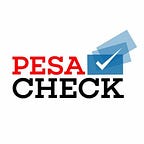FALSE HEADLINE: This article does not state that certain blood types can protect against HIV infection
The article has been copied from an online medical resource that discusses the relationship between genetics and HIV resistance.
An article published by online content aggregator Opera News claiming that people who have a particular blood type cannot contract HIV/AIDS has a FALSE HEADLINE.
The article was reshared from olexhome.info, but most of its content has been copied from another post published in 2019 on verywellhealth.com — a peer-reviewed online resource for medical information.
The author, Elizabeth Boskey, PhD, who is a social worker and expert writer in the field of sexually transmitted diseases, includes none of the assertions made by the headlines of the article on Opera News and olexhome.info.
Rather, Dr Boskey tries to make sense of the relationship between genetics and HIV resistance. She bases her argument on a study carried out by Swedish researchers in 2009, which revealed a new genetic mutation that may confer some level of resistance to HIV.
According to the study, cells with high levels of Pk, a protein found on the surface of several types of blood cells, are significantly harder to infect with HIV than cells with no Pk.
But while this case of genetic resistance has played an important role in research for a functional cure, Dr Boskey cautioned that it would be grossly premature to say that blood type can protect against HIV infection.
“Pk is a way of typing blood. However, it is not commonly used and not part of either the A/B/O or Rh typing systems,” she writes.
Moreover, the study only looked at in vitro susceptibility and studies have yet to be conducted in a living organism.
The article published on Opera News appears to promote an online dating site for HIV-positive individuals, and contains text directly contradicting the headline.
PesaCheck has looked into an article published by online content aggregator Opera News, claiming that people with a particular blood type can never contract HIV/AIDS, and finds it has a FALSE HEADLINE.
This post is part of an ongoing series of PesaCheck fact-checks examining content marked as potential misinformation on Facebook and other social media platforms.
By partnering with Facebook and similar social media platforms, third-party fact-checking organisations like PesaCheck are helping to sort fact from fiction. We do this by giving the public deeper insight and context to posts they see in their social media feeds.
Have you spotted what you think is fake news or false information on Facebook? Here’s how you can report. And, here’s more information on PesaCheck’s methodology for fact-checking questionable content.
This fact-check was written by PesaCheck Fact-Checker Simon Muli and edited by PesaCheck Deputy Editor Enock Nyariki.
The article was approved for publication by PesaCheck Managing Editor Eric Mugendi.
PesaCheck is East Africa’s first public finance fact-checking initiative. It was co-founded by Catherine Gicheru and Justin Arenstein, and is being incubated by the continent’s largest civic technology and data journalism accelerator: Code for Africa. It seeks to help the public separate fact from fiction in public pronouncements about the numbers that shape our world, with a special emphasis on pronouncements about public finances that shape government’s delivery of Sustainable Development Goals (SDG) public services, such as healthcare, rural development and access to water/sanitation. PesaCheck also tests the accuracy of media reportage. To find out more about the project, visit pesacheck.org.
PesaCheck is an initiative of Code for Africa, through its innovateAFRICA fund, with support from Deutsche Welle Akademie, in partnership with a coalition of local African media and other civic watchdog organisations.
